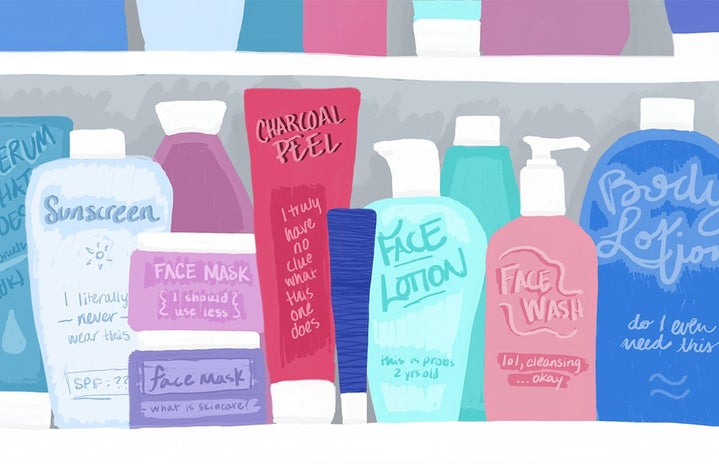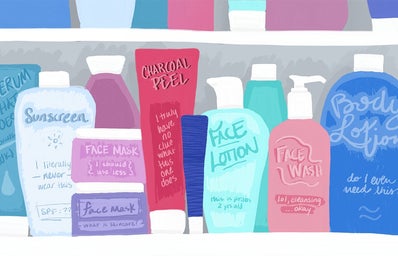By now, I believe many of us have heard about the recent epidemic of pre-teen girls flooding Sephora; they are using their recently obtained Christmas money, buying hundreds of dollars worth of skincare products, and many are even being rude to employees and other customers in store. This outrage among Sephora shoppers has been loudly voiced throughout social media platforms through storytime-style videos that not only discuss the irritating experiences of witnessing groups of pre-teen girls in the store, but also the types of products and volume at which these girls are purchasing them. While there is nothing wrong with learning the importance of washing your face and applying sunscreen from a young age, the major concern from Sephora employees and customers are the $100 retinol serums and other formulated creams for anti-aging that pre-teen girls are buying in large quantities. In these storytime-videos and online discussions about the surplus of pre-teen girls in Sephora, the largest question that accompanies the shoppers’ outrage is: who is to blame? Who is to blame for these girls spending hundreds of dollars on beauty and anti-aging products? Who is to blame for young girls being so invested in skin and beauty from such a young age? Some argue that it is the parenting style of millennial parents, others blame Gen Alpha’s early exposure to social media. While these are valid points of concern, I believe that there has been a neglect of discussing the true root of the issue, which is culture around self-care, anti-aging, and consumerism in women’s beauty.
What do you imagine when you think of self-care? Within the media, we primarily see self-care represented through things like skincare masks, wearing cucumbers on our eyes, and other beauty-focused treatments which can be relaxing and fun. While self-care surely can include things like treating yourself to a bubble bath or giving your skin some TLC, self-care can also look like sleeping in a little longer or spending time with loved ones. However, the issue is that certain depictions of self-care have mutated in the women’s beauty industry to look only like one thing: consumerism. Self-care has become conflated with beauty alone, and it takes the form of ‘rejuvenating’ beauty products and ‘collagen restoring facial creams’ that are made to be consumed by women, which succeeds under the guise of self-care, because self-care is non-negotiably positive. However, this is a repackaged obsession with youth and anti-aging and because women’s value as people is determined by their appearance, the pressure of looking young forever is posed as attainable and desirable, rather than aging the way every human inevitably will.
So what does this have to do with Gen Alpha taking the last eye cream at Sephora? Well, we have to understand where the intention of using anti-aging products at a younger age stems from, and how it is marketed to pre-teen girls. When watching influencers online who start using sunscreen or retinol, one of the primary ideas they mention is how they wish they started using it earlier, so they could look even better at their current age. The idea of starting anti-aging skin care earlier for Gen Alpha does not come from a place of trying to undo their appearance for a younger one, rather it is in favour of taking preventative measures to aging. When we promote things like ‘preventative botox’ and ‘preventing signs of age,’ we attach a morality to optional cosmetic choices. The term ‘preventative’ and taking preventative measures against aging assigns responsibility and obligation to individuals. If you did not take these preventative measures, well, it means that you are someone who lacks discipline and does not engage in self-care. Young girls do not think to themselves “I wanna make sure that I never look old,” but they are taught that looking old is a bad thing. We should expect that with access to social media, younger audiences will have access to consumerist trends; the solution is not censorship or to get mad at children, but it is to reflect on where we are placing our values as a society, not just for younger women, but for the experience all women are subjected to with unrealistic beauty standards.
The reality is that we hold social responsibility over what we promote as healthy interactions with beauty, not just for young girls, but for all women. The relationship that younger and older women have with beauty would differ if there was less urgency and panic towards one’s value decreasing with signs of age. When we stop believing that women ‘expire’ when they show visible signs of age and when we are able to be proud of showing signs of life in aged skin, women of all ages will be able to have healthy, realistic relationships with themselves and with age. While no individual can control the weight of consumerist beauty standards, we can control the type of relationship we have with product consumption, and how we treat aging for women. By fostering a positive relationship with signs of age, and separating beauty choices like anti-aging from well being, women’s beauty can be an uplifting space for all ages.

